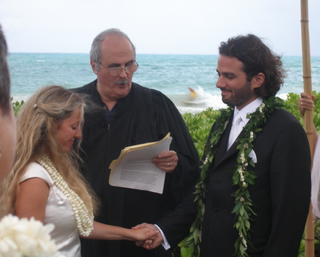the tone of this little corner of the blogosphere has, well, gotten a bit heady of late, and thus I endeavor here to bring it down a notch or two.
which leads me to comment on Sam's post below on blogging. I have been reflecting on the phenomenon of the first few weeks of blogging for, well, the first few weeks of blogging. it's an interesting medium, in that audience becomes at first a problem (as in, to whom am I talking? who will care?) and then, if you let that go, the question of audience becomes an interesting ghost behind your writing, occasionally sitting on your shoulder and suggesting that perhaps, in the interests of ever wanting to return to the US, one might not want to post that
GW Bush is a dickwad on one's blog. Or, as in the case of a friend of mine who just e-mailed me (let's call him/her JO), leading you to establish elaborate anonymity schemes for those you are talking about so as not to hurt anyone (including, let's face it, yourself). I have attempted to avoid the latter, but it does require some effort, which is interesting. I've read on
other blogs that the blogger's friends seem to know them better through the blog than through direct interpersonal contact, for example, which while at first glance is somewhat disturbing, at second glance makes sense: you are whomever your audience reflects back to you, and so when there's no reflection, it's up to you to figure out who you are at that moment. So blogging. very interesting. not at all linear, not at all contained.
which brings me to washcloths.
over the past few weeks, I've been thinking that I should blog about washcloths. when you have a blog this is a common thought (not the specifics of the washcloth, of course—that's just my neurosis) and that's interesting, because as
Sam says below, the timing of the blog/thought pattern is different than any other writing one usually does.
but my washcloth "insight" is related to
OddsAreOne's postings about narrative and the universe. for I haven't used a washcloth in I don't know how many years. and then we got some of that fab
Dr. Bronner's liquid soap stuff, and as I am morally opposed to those
silly poof balls that were all the rage in mid-1998, I pulled out a washcloth. suddenly, I'm five. it's astounding. you should try it. the feeling of washing your face and ears with a washcloth is exactly like when you were five. there's no linearity to it, no narrative, no physical connection even, as the skin cells etc. I have today have turned over however many times since I was five, right? the disconnect, the forgetting of that feeling—it wasn't even a memory before I used the washcloth again a few weeks ago. this is how time and history works—how narrative and memory work. vide the ghosts Sam writes about in his
book. we can't predict them, we can't know when they will return (see OddsAreOne's
postings about social science and stats here) but they are real, and it's likely (what are the odds?) that they will return.
So it's not about the predictability, it's about the manner in which the universe operates, right? storytelling, repeating (not precisely) the same tale, the same narrative. that's what Richard Powers' books are all about too—multiple narratives. so much for non-heady. to sum up:
no new narrative can be written. writing is rewriting. touching (
haptics, if you will) is crucial for our understanding of the universe. and well, you are now and always have been five.

